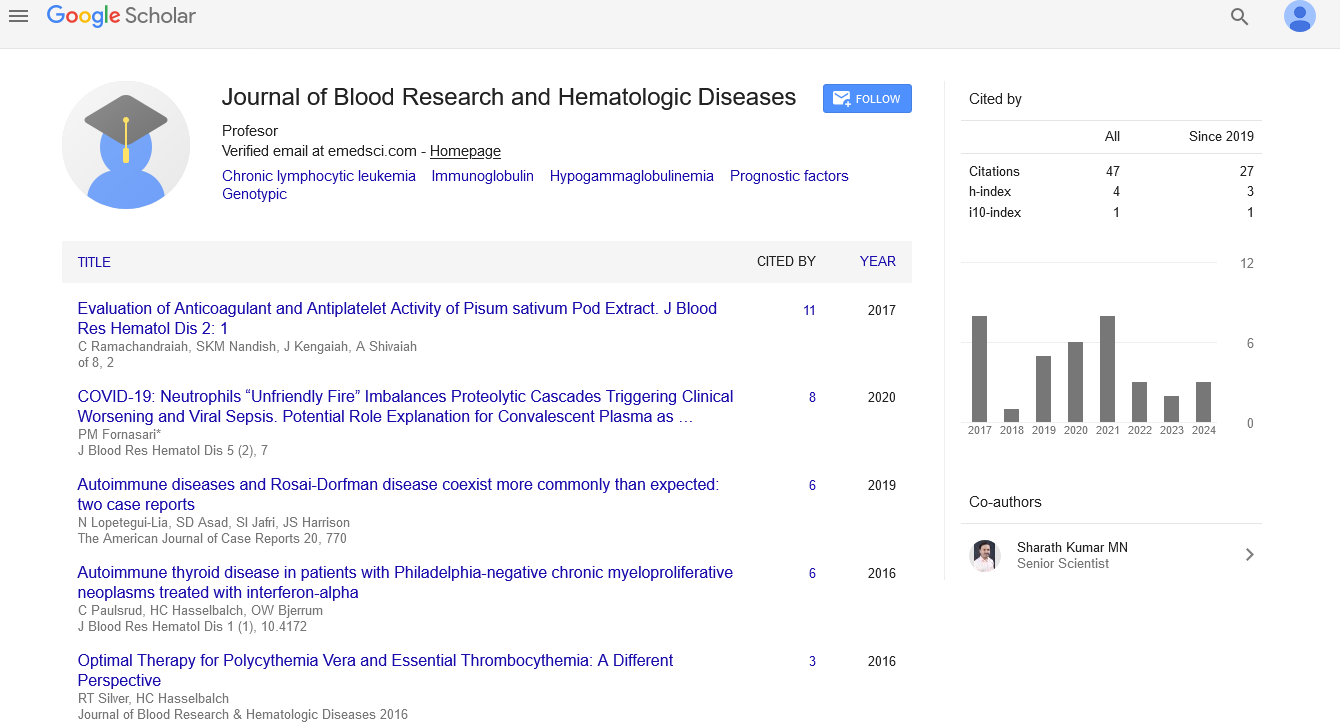Perspective, J Blood Res Hematol Dis Vol: 10 Issue: 1
Exploring the Advantages and Disadvantages of Blood in Healthcare
Anneise Puillermin*
Department of Pathology, St. Louis University, St. Louis, United States of America
*Corresponding Author: Anneise Puillermin
Department of Pathology, St. Louis University, St. Louis, United States of America
E-mail:anneisep@gmail.com
Received date: 24 May, 2024, Manuscript No. JBRHD-24-137140;
Editor assigned date: 27 May, 2024, PreQC No. JBRHD-24-137140(PQ);
Reviewed date: 11 June, 2024, QC No. JBRHD-24-137140;
Revised date: 10 March, 2025, Manuscript No. JBRHD-24-137140 (R);
Published date: 17 March, 2025, DOI: 10.4172/jbrhd.1000215
Citation: Puillermin A (2025) Exploring the Advantages and Disadvantages of Blood in Healthcare. J Blood Res Hematol Dis 10:1.
Introduction
Blood is a vital component of human health, playing a crucial role in various medical interventions and treatments. From life-saving transfusions to diagnostic tests, its importance cannot be overstated. However, like any medical resource, blood also comes with its own set of advantages and disadvantages that must be carefully considered in healthcare settings.
Description
Advantages of blood in healthcare
Life-saving transfusions: Perhaps the most critical advantage of blood in healthcare is its ability to save lives through transfusions. Patients suffering from severe blood loss due to trauma, surgery, or medical conditions like anemia rely on blood transfusions to replenish lost blood volume and essential components like red blood cells, platelets, and plasma.
Treatment of blood disorders: Blood plays a pivotal role in treating various blood disorders such as hemophilia, thrombocytopenia, and sickle cell disease. Therapies involving blood products or components help manage symptoms and improve patients' quality of life.
Diagnostic capabilities: Blood tests are fundamental diagnostic tools used to assess a wide range of health conditions. They provide valuable information about organ function, infection, inflammation, hormonal balance, and blood cell counts, aiding in early detection, diagnosis, and monitoring of diseases.
Research and development: Blood is integral to biomedical research and development. Studies involving blood samples contribute to advancing medical knowledge, understanding disease mechanisms, developing new therapies, and improving patient outcomes.
Compatibility and safety measures: Advances in blood typing and cross-matching techniques ensure transfusion compatibility, minimizing the risk of adverse reactions such as transfusion-related infections or immune reactions. Rigorous screening processes for blood donors also enhance the safety of blood products used in healthcare.
Disadvantages of blood in healthcare
Supply and demand challenges: Maintaining an adequate and safe blood supply can be challenging due to fluctuations in demand, logistical issues, and donor shortages. Blood shortages can impact patient care and surgical procedures, highlighting the ongoing need for blood donation awareness and recruitment efforts.
Transfusion risks: While transfusions are generally safe, they carry inherent risks such as transfusion reactions (e.g., allergic reactions, febrile reactions) and more serious complications like Transfusion-Related Acute Lung Injury (TRALI) or hemolytic reactions. Vigilance in screening donors and compatibility testing helps mitigate these risks.
Cost and resource intensiveness: Blood transfusions and bloodrelated therapies can be costly and resource-intensive for healthcare systems, especially in settings with limited resources or where specialized blood products are required.
Ethical and religious considerations: Some individuals may have ethical or religious objections to blood transfusions or certain blood products, presenting challenges in healthcare decision-making and patient management. Respect for patient autonomy and cultural beliefs is crucial in addressing these considerations.
Emerging pathogens and safety concerns: Despite stringent screening protocols, emerging pathogens such as new strains of viruses or antibiotic-resistant bacteria pose ongoing challenges to blood safety. Continuous monitoring and research are essential to adapt to evolving threats and ensure the safety of blood products.
Conclusion
In conclusion, while blood offers indispensable benefits in healthcare, including life-saving treatments and essential diagnostic tools, it also presents challenges and considerations that healthcare professionals must navigate carefully. Advances in technology, research, and transfusion practices continue to improve the safety, efficacy, and accessibility of blood products, underscoring the ongoing importance of blood in modern healthcare practices. Balancing these advantages and disadvantages is crucial in optimizing patient care and outcomes while ensuring the ethical and safe use of blood in medical settings.
 Spanish
Spanish  Chinese
Chinese  Russian
Russian  German
German  French
French  Japanese
Japanese  Portuguese
Portuguese  Hindi
Hindi 